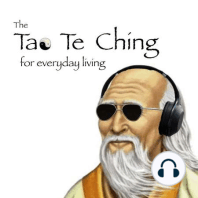24 min listen

Tao Te Ching Verse 27: Learning from Students
Tao Te Ching Verse 27: Learning from Students
ratings:
Length:
36 minutes
Released:
Mar 27, 2020
Format:
Podcast episode
Description
Tao Te Ching Verse 27translation by Gu ZhengkunHe who is good at walking leaves no traces;He who is good at speaking leaves no slipsHe who is good at counting uses no counting tools;He who is good at shutting renders all efforts of opening in vain though he uses no bolts;He who is good at tying renders all efforts of untying in vain though he uses no ropes.That is why the sageIs always good at saving peopleAnd abandoning no one;That is why the sage is always good at saving thingsAnd abandoning nothing.This is called the intrinsic wisdom.Thus the good man is the bad man's teacher;The bad man is the material from which the good draws lessons.If honouring not one's teacher,Or loving not one's material,One is a big fool though he seems clever.Here lies the vital secret.Photo by Monica Melton on UnsplashOur teachers are our studentsLao Tzu continues in the third part: The good person is the bad person’s teacher. The bad person is the good person’s lesson.Let’s spend a couple moments with this one; placing myself in the role of the teacher for a moment, I can imagine me standing in front of people and transferring information. In a one on one setting, I am still transferring knowledge, but also get to be less prescriptive about it - I can interact with the person I’m mentoring. But here’s the thing - I am not a teacher or mentor without the other person. The other person gives me my purpose in that moment. So as a teacher, I am defined by the student. It works the other way around: if I am a student, I am allowing another person to transmit knowledge, wisdom, and experience to me. I am a student because there is a teacher willing to do this. So just like :good’ needing ‘bad’ to define it, light needing dark to define it, a teacher must have a student to define her.Put another way, this line in the verse is saying there are those with knowledge and those without. We can call those with knowledge teachers and those without students. The teacher gives knowledge to the student. But it is the student that tells the teacher what knowledge is lacking. Therefore, the student is actually the teacher.Let’s look at this teacher / student relationship another way, now. I think it’s possible that invariably, just as we find ourselves sometimes leaders and sometimes followers, we are sometimes teachers and sometimes students. Aren’t there times when someone asks your advice or doesn’t know how to do something? And you tell them, if only to share what you Know? Doesn’t it feel great to be able to share that? And sometimes, though idk about you but I know for me, it’s a little painful to admit I don’t know something, but those moments when I can ask, aren’t I being the student? There’s this swapping of roles that I do from time to time. I don't’ think I can ever be just one or the other. Sometimes I teach, sometimes I learn.
Released:
Mar 27, 2020
Format:
Podcast episode
Titles in the series (80)
Tao Te Ching Verse 1: Welcome to the Tao by The Tao Te Ching for Everyday Living